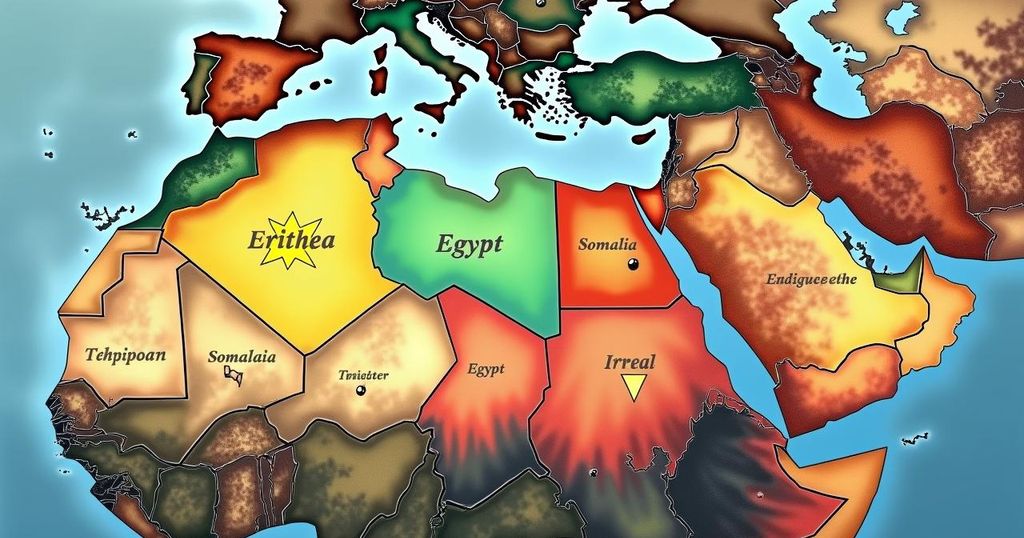Strengthening Alliances: Eritrea, Egypt, and Somalia’s Strategic Coordination Against Ethiopia
Leaders of Eritrea, Egypt, and Somalia convened in Asmara, forming an alliance against Ethiopia amidst ongoing tensions. While discussions focused on cooperation and regional challenges, concerns persist regarding military support from Egypt to Somalia and Ethiopia’s aspirations for a port. Historical grievances continue to fuel a delicate geopolitical landscape.
The recent summit involving the leaders of Eritrea, Egypt, and Somalia, conducted in Asmara, has cultivated a cooperative alliance among these nations, all of which maintain strained relations with Ethiopia. An official statement released at the conclusion of the meeting emphasized the importance of upholding the sovereignty and territorial integrity of regional countries, which could be interpreted as a veiled reference to Ethiopia’s aspirations for access to a seaport. Somalia’s recent diplomatic discord has inclined it towards closer associations with Egypt and Eritrea, both of which have longstanding disputes with Ethiopia. On various fronts, there are concerns that this increasing tension may lead to conflict. Hassan Khannenje, the director of the Horn International Institute for Strategic Studies, articulated this sentiment during an interview, stating, “This is an axis against [Ethiopian capital] Addis Ababa. I think it’s an attempt to bring the hate together in trying to increase pressure against Addis Ababa.” However, Somalia’s Information Minister, Daud Aweis, countered by asserting that the summit asserted cooperation rather than hostility: “We are not determined to instigate anything against Addis Ababa.” He acknowledged the history of cooperation between Somalia and Ethiopia, despite recent tensions stemming from Ethiopia’s involvement with Somaliland, which Somalia claims as its territory. The meeting also demonstrated a united front among the leaders; a photograph released post-summit captured President Isaias Afwerki of Eritrea with Egyptian President Abdul Fattah al-Sisi and Somali President Hassan Sheikh Mohamud. Their discussions focused on enhancing Somalia’s state institutions to effectively deal with both internal and external challenges, particularly in combatting terrorism. In addition, Egypt has notably been ramping up military support for Somalia, with a recent shipment consisting of military equipment arriving via Egyptian vessels. Relations between Ethiopia and Egypt have been increasingly tumultuous over issues surrounding Ethiopia’s hydroelectric dam construction on the Nile River, which Egypt fears could jeopardize its water supply. Furthermore, the once-friendly ties between Ethiopia and Eritrea, which had flourished following the peace agreement in 2018, have diminished, particularly following Ethiopia’s civil conflict in Tigray and Abiy Ahmed’s ambitions for port access on the Red Sea.
The geopolitical landscape of the Horn of Africa has been considerably influenced by the turbulent relationship between Ethiopia and its neighboring countries. Historically, Eritrea and Egypt have both held grievances against Ethiopia, primarily concerning territorial disputes and resource management. Egypt’s longstanding apprehensions regarding Ethiopia’s construction of the Grand Ethiopian Renaissance Dam (GERD) on the Nile reflect a deep-seated fear of potential water scarcity. Simultaneously, Somalia, notwithstanding its prior reliance on Ethiopian support in ensuring regional stability against groups like Al-Shabab, has recently felt threatened by Ethiopia’s deals with Somaliland, a self-declared republic that Somalia considers a part of its territory. The evolving dynamics among these nations signal potential shifts in alliances as they respond to both internal and regional challenges.
The developments stemming from the summit in Asmara suggest a strategic alignment of Eritrea, Egypt, and Somalia in opposition to Ethiopia, amidst a background of longstanding tensions. While some leaders deny intentions of hostility, the formation of this alliance raises concerns regarding potential escalations in conflict. As the situation unfolds, the historical grievances and emerging geopolitical interests of these nations will play a decisive role in shaping the future of relations in the Horn of Africa.
Original Source: www.capitalfm.co.ke




Post Comment